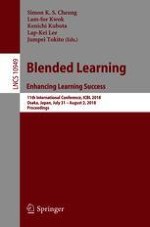2018 | OriginalPaper | Buchkapitel
Application of Gamification to Blended Learning in Elementary Math Instructional Design
verfasst von : Ruonan Hu, Junjie Shang
Erschienen in: Blended Learning. Enhancing Learning Success
Aktivieren Sie unsere intelligente Suche, um passende Fachinhalte oder Patente zu finden.
Wählen Sie Textabschnitte aus um mit Künstlicher Intelligenz passenden Patente zu finden. powered by
Markieren Sie Textabschnitte, um KI-gestützt weitere passende Inhalte zu finden. powered by
